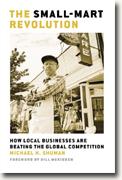The Small-Mart Revolution
Michael H. Shuman
book reviews:
· general fiction
· chick lit/romance
· sci-fi/fantasy
· graphic novels
· nonfiction
· audio books
· author interviews
· children's books @
curledupkids.com
· DVD reviews @
curledupdvd.com
newsletter
win books
buy online
links
home
for authors
& publishers
for reviewers

 |
The Small-Mart Revolution: How Local Businesses Are Beating the Global Competition Michael H. Shuman Berrett-Koehler Paperback 285 pages August 2007 |
|
Warning: If you dine out on stories of how much you save by shopping at big-box stores, you may not be ready for the small-mart revolution. But it’s coming, if author Michael H. Shuman has any say-so.
How can buying a pair of sneakers at the cheapest available price be a bad thing? Shuman demonstrates how as he takes us on a recent shopping trip through a major chain retailer, where he ends up loading the cart with more than $200 in unplanned purchases, overpays on items for which the scanner rings up incorrect prices, and discards within two weeks a number of items that fall apart or don’t work properly once they’re unpacked at home. Additionally, the “inexpensive” sneakers he buys year after year at that particular retailer turn out to be a factor in his lower back pain, according to a medical professional he consults. But the quality of low-priced items is, perhaps, only the most obvious added expense of buying them. Shuman goes on to explore the costs to a community when a giant retailer sets up shop and displaces locally-owned retailers, lowers the average per-hour pay in the community, routes sales away from local producers who cannot compete with overseas production pricing, carries produce from distant growers rather than local farmers (necessitating additional transport and packaging), and introduces issues of suspect product quality by purchasing items made in countries where environmental and production quality laws may be more lax than in the U.S. If none of these factors gives you pause, consider other effects on a community when its members stop buying locally produced artwork, music, fashion and food. Who will dictate the regional cuisine of New Orleans, Omaha or Dallas? Who will remember in 200 years that there was such a thing as regional cuisine if all that’s found in our landfills is empty foil trays from frozen lasagna and taquitos? Shuman also explores the differences between TINA and LOIS—not two romantic rivals but two contradictory ways of looking at enterprise. TINA stands for “There Is No Alternative,” a phrase about globalization spoken by former British Prime Minister Margaret Thatcher. LOIS, on the other hand, stands for a fundamentally different economic model based on Local Ownership and Import Substitution. LOIS extends to more than product purchasing: Patronizing local providers of services from home mortgages to investment banking to charitable giving will revitalize our communities and retain wealth in (or return it to) our neighborhoods, says Shuman. He highlights numerous success stories of towns that have overcome the loss of their primary employer to become vibrant, productive, diversified communities. He also lists resources for those interested in starting a community LOIS effort where they live. Michael H. Shuman is the former director of the Institute for Policy Studies in Washington, D.C., cofounder of the Business Alliance for Local Living Economies, a current Vice President for Enterprise Development at the Training & Development Corporation, and an author of several books. He confesses to at least one annual shopping excursion to a well-known major retail chain. For sneakers. Originally published on Curled Up With A Good Book at www.curledup.com. © Erica Jeffrey, 2007 |
|
|
|
 Click here to learn more about this month's sponsor! |
|
| fiction · sf/f · comic books · nonfiction · audio newsletter · free book contest · buy books online review index · links · · authors & publishers reviewers |
|
| site by ELBO Computing Resources, Inc. | |
 Shuman’s book,
Shuman’s book,